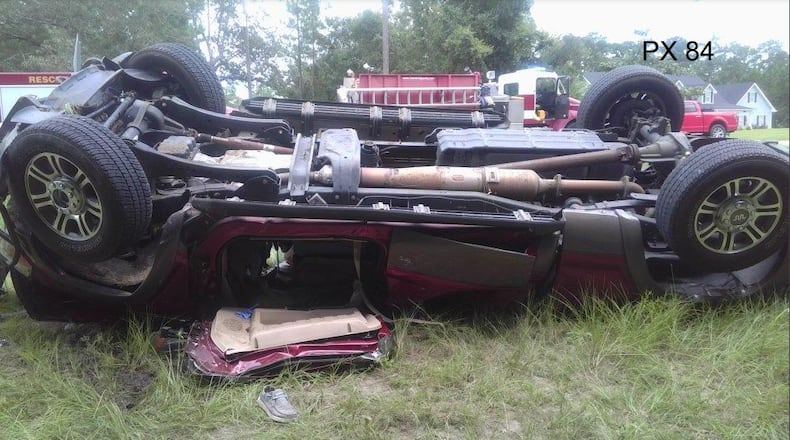Ford Motor Co. owes more than $2.5 billion to the family of a couple killed in a 2022 rollover in one of the company’s “Super Duty” trucks, a Georgia federal jury found, marking the largest verdict in Georgia history.
The automaker now holds the dubious honor of having itself on the wrong end of the two largest verdicts in Georgia history, both of which were awarded in recent years.
A jury in Columbus found that Ford was mostly at fault for the deaths of two people after their truck rolled over in an accident that occurred just days after a separate state court jury issued a $1.7 billion verdict against the automaker in a similar suit. That verdict was the previous record-high award in Georgia.
Herman, 74, and Debra Mills, 64, were driving in Decatur County on Aug. 22, 2022, in their 2015 Ford F250 “Super Duty” truck when it rolled over and the roof crushed down on them, according to the suit. They died in the crash.
Debra Mills was driving the truck with Herman Mills in the passenger seat when the truck struck a driveway drainage culvert, causing the vehicle to go airborne for about 81 feet before smashing into the ground and flipping over, according to filings in the case.
“It was only a half roll, yet the roof catastrophically collapsed into the passenger compartment,” James E. Butler, the lead attorney for the Mills family, said in a news release.
Attorneys for the Mills’ children, James “Dusty” Brogdon, Ronald “Rusty” Brogdon and Jason Mills, had argued that the roofs of all 1999-2016 “Super Duty” trucks were “indisputably weak” compared to their F150 models and said the roof on the Mills’ other F250 from 2002 was similar but not the same.
Ford argued that the deformation of the roof in the crash did not cause the couple’s death.
“While our sympathies go out to the Brogdon family, the verdict is impermissibly extreme and not supported by the evidence,” a spokesperson said. The company noted that juries in other cases found that the roofs of the “Super Duty” trucks were not defective, and said that Ford will appeal.
The motor company also argued that Debra Mills suffered a cardiac attack as she was driving the vehicle, which Ford says caused her to crash in the first place.
Butler, the attorney for the family, said that Debra Mills died on the scene but that it took first responders 26 minutes to pry Herman Mills out from under the collapsed roof and he died in a Florida hospital later.
The jury, in the verdict form, assigned 85% of the fault for the Mills’ death to Ford with the remaining 15% given to Debra Mills.
Dusty Brogdon, executor of the Mills’ estate, along with brothers Rusty Brogdon and Jason Mills filed the lawsuit against Ford on May 23, 2023, in Harris County, but the case eventually wound up in federal court in Columbus, court records show.
Dusty and Rusty were Debra’s children, while Jason was Herman’s child.
“Ford has known for 26 years that people were getting killed and hurt by these weak roofs,” Butler said. “Ford has constantly refused to admit the danger or warn of the risk.”
The jury rendered the verdict in two phases, one for compensatory damages on Thursday awarding $30.5 million and the other for punitive damages on Friday awarding the other $2.5 billion.
The Mills crash happened just days after a Gwinnett County jury awarded a $1.7 billion verdict against Ford in a wrongful-death lawsuit stemming from a 2014 rollover crash involving another F250 that killed Voncile and Melvin Hill.
The Hills were driving from their Macon County home to Americus to pick up a tractor part when a tire blew out on a Sumter County highway in 2014 and their 2002 Ford “Super Duty” F250 pickup rolled over.
Butler also represented the Hill family in their trial.
The verdict was later wiped out by the state’s Court of Appeals after the court found that the Gwinnett County judge improperly prevented Ford from arguing in the second trial that it was not liable in the deaths of the Hills.
The whopping verdict on Friday comes as Gov. Brian Kemp pushes for an overhaul of Georgia’s legal system, including a proposal to reduce the amount juries can award and limit certain lawsuits. His proposal would limit when businesses can be sued for some injuries that occur on their properties, regulate how damages are calculated in personal injury cases, allow juries in some cases to consider whether someone was wearing a seat belt in determining awards and restrict outside groups from bankrolling litigation.
Kemp said he believes some of the lawsuits have gotten out of hand in recent years, resulting in massive jury payouts. Neither the Hills’ nor the Mills’ families have been paid yet based on the awarded jury verdicts in the Ford cases.
Kemp’s proposed legislation wouldn’t impact federal cases like the Mills’ case.
Before the verdict awarded $1.7 billion to the Hills, Georgia’s largest verdict was from 27 years ago, when another Gwinnett jury imposed $457 million against Time Warner and affiliates in a contract dispute involving Six Flags Over Georgia.
About the Author
Keep Reading
The Latest
Featured



